The St Jude’s Rotary office was filled with the sounds of craftwork as Interactors got busy with their latest community project.
“We are making blackboard dusters to give to schools. I think I have made over five so far!” explains enthusiastic secondary student Eva.
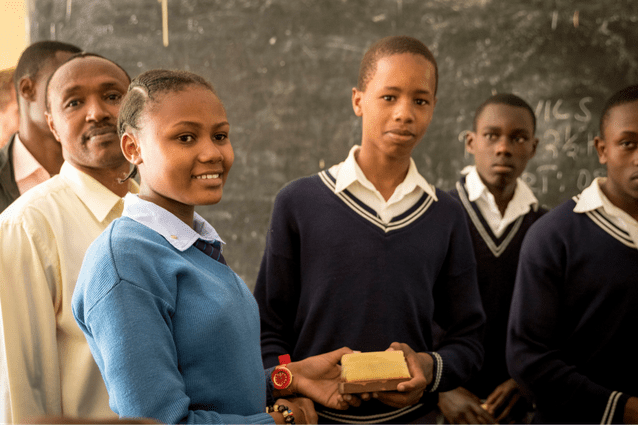
As well as being a practical show of goodwill for a local school, who can then prioritise their limited budget on providing more books for their students, the blackboard dusters have another benefit. They are made out of recycled foam from old mattresses and help reduce the amount of waste going to landfill. The soft, spongey material is perfect for a new life as a duster!
Once a mini mountain of dusters had been made, our students hopped on a St Jude’s bus to give them to two neighboring schools in Arusha - Oldadai and Njiro Secondary Schools. The smile from Oldadai Secondary School headmaster Urio Godson shows they were well received!
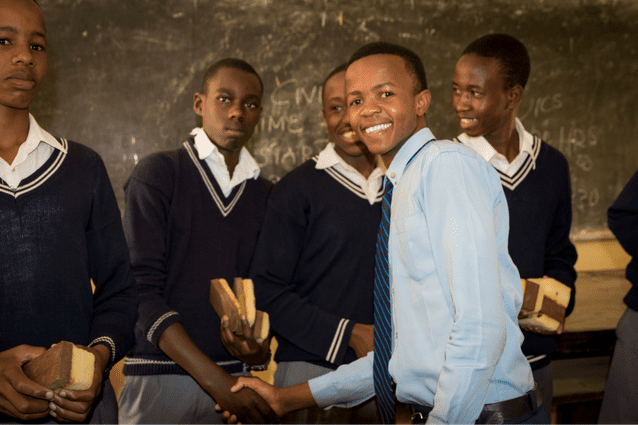
Both schools are supported by our Community Service Year Interns (CSY) Interns. Many local government schools do not have enough teachers, and a student to teacher ratio that makes effective teaching difficult. It is not uncommon to see over 100 children in one classroom.
Daudi is one of last year’s St Jude graduates doing his Community Service Year at Njiro Secondary School, and Kelvin is at Oldadai Secondary School. Now that The School of St Jude has both intern teachers and a supply of blackboard dusters to help support our local community, we are sure our Rotarian students can build on this with their community project plans in the future.
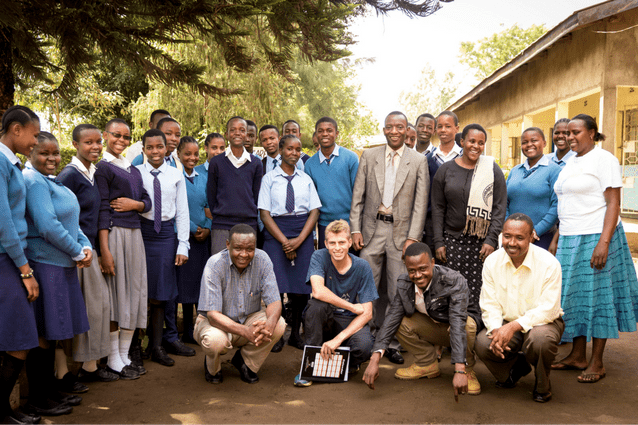
Interact gives our students the confidence to present their ideas and the opportunity to get a project off the ground and out into the world. The blackboard duster project was the brainchild of Edgar from Form 3. Rotary Coordinator Seb was full of praise for the community-minded student.
“He is brilliant. Edgar constantly tries to develop more knowledge about Rotary and goes to the library to research in his free time,” he said. “The dusters were his idea. He came to me with the idea and I encouraged him to take it to the club President and board. He even taught the other Interactors how to make them.”
St Jude’s students love to help others, so show your support for their community enthusiasm by helping fund their projects. They learn skills for life and grow confidence!
There’s not a more exciting way to start the year at The School of St Jude than with Uniform Day.
The 50 Grade 1 students who made it through the our most recent thorough selection process were recognized and celebrated by being fitted for and dressed in their very own St Jude’s uniforms.
These underprivileged yet promising young students are now looking the part to spend the rest of the year making the most of their free, high-quality education.
In their new threads, the proud students were cheered and hugged as the celebration call of parents rang out loud across the school.
“We are so pleased to welcome a new group of keen young students to St Jude’s. It’s particularly exciting this year as we have now been welcoming young achievers such as these through our gates for 15 years,” school founder Gemma Sisia said. “There really is no better way to start the school year than seeing the faces of these students and their parents light up on Uniform Day.”
These students successfully passed rigorous academic testing and poverty assessment, which we conducted over multiple months, to be honoured with the scholarships. They were chosen from more than 700 eligible youngsters in the Arusha region, for their academic ability, social and leadership qualities and financial disadvantage.
“It’s a fair and thorough process to ensure students and their families, as well as their sponsors, receive the upmost benefit of a St Jude’s education,” Gemma said.
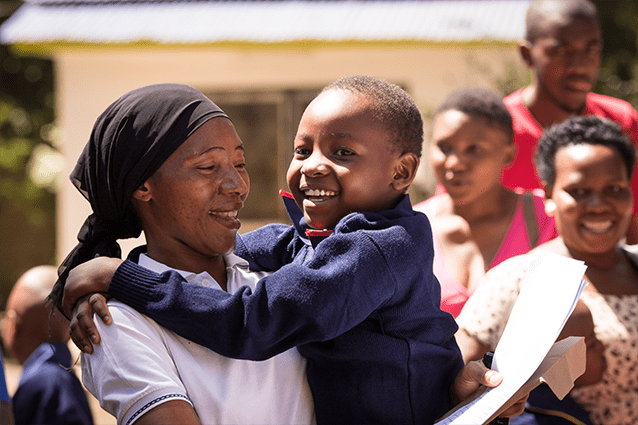
The purpose of the strict entrance testing is to ensure we reach the families who need your support the most.
In 2017, we are proud to be educating more than 1,800 in-need Tanzanian students throughout the past 15 years, with more than 200 having already graduated Form 6.
Students who successfully retain their St Jude’s scholarship throughout their schooling have the opportunity to graduate in Form 6 with a much higher chance of receiving a university education.
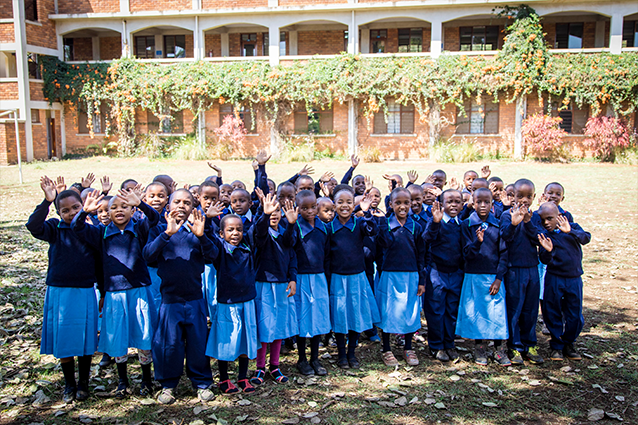
We can’t wait to see what this opportunity brings our youngest bright students!
They’ve finished in the academic top 1% in the nation, and now our Grade 7’s are showing their maturity by demonstrating community spirit during their holidays.
Our Grade 7s recently came third from 68 schools in the district and improved in the national rankings. All students finished with marks of either ‘A’ or ‘B’ in their national exams, qualifying St Jude’s as one of the top primary schools in Tanzania.
Primary school headmaster George Stephen was unsurprisingly thrilled with the outcome.
“I would like to congratulate every one of us (within the primary school) who worked to achieve these good results. Your hard work is appreciated,” he said.
“Let’s continue working towards more performances like this.”
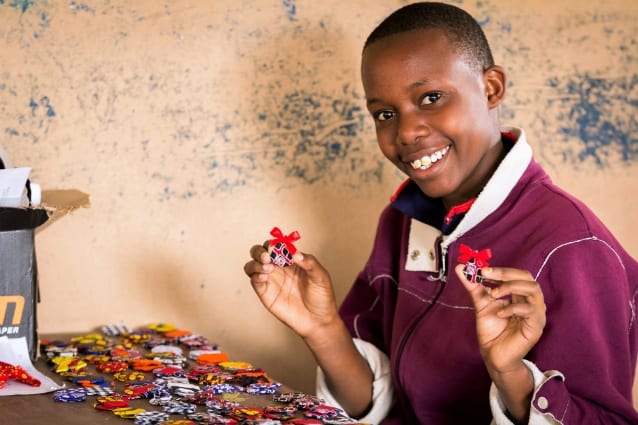
More than 30 of these enthusiastic, soon-to-be primary school graduates have busily spent their end of school-year break volunteering for our school community.
Anethi (Annette) is one such inspirational student. She has chosen to give back by helping to prepare the hundreds of meals our kitchen serves each day, as well as sharing her creative skills in the art room.
“I wanted to help so I just said I would (in both areas),” Anethi explained, adding that she knew she could be an asset in the kitchen as she often helps her mother prepare family meals.
“I help in the (school) kitchen by washing utensils, cutting vegetables and helping serve lunch.”
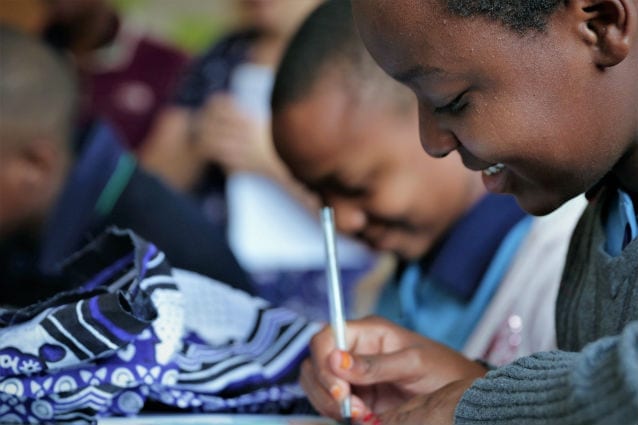
Anethi, along with her friends Nasma, Nasabi, Martha, Elizabeth, Lightness and Brenda, help create Christmas cards and crafty creations for our supporters. Her favourite project has been bottle-top earrings, which Gemma will bring on her tour next year.
“I really like making the earrings and working with my friends on crafts,” she said, singing the praises of Miriam, a St Jude’s Form 6 graduate who is co-ordinating the program.
“She’s good, she helps us lots and it’s fun. I am enjoying it very much.”
Miriam said she has appreciated working with the young students, and enjoyed giving them guidance in both life and their art projects.
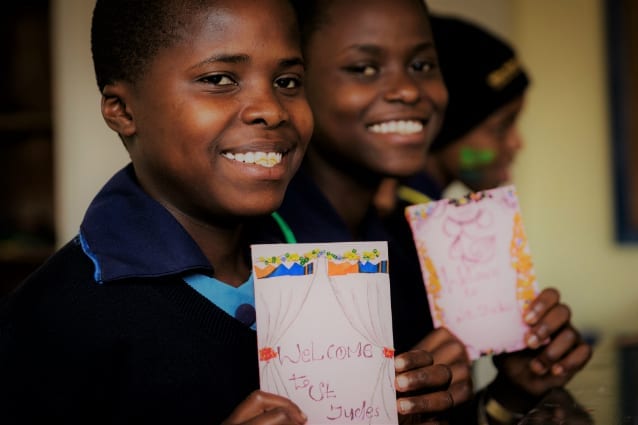
“Originally I was hoping to have 10 students (to help with projects), but the 7 I have are better than 10. They are perfect,” Miriam said.
Miriam said students like shy, smiley Anethi were greatly appreciated for their volunteering, and the Grade 7 group as a whole are high-achieving, excellent examples of student leaders.
Donate to St Jude’s and help us remain in the top 1% for many years to come. Go here to find out how.
2016 graduate and Community Service Year intern Godfrey has been working with the Marketing and Photography teams here at St Jude’s for the last two months. The talented 21-year-old has been hard at work, helping on a range of projects and improving his skills.
Godfrey’s most recent piece of work is a short video that shares the day in the life of our boarding students.
“I like videos,” he said.
“I like the way I can tell a story through photos and videos. They are a way of expressing feelings in the modern world, they allow us to share stories about the past, the present and look into the future.
“My favourite part of the Community Service Year has been learning new skills with videos and editing and getting the chance to take photos and film videos.
“I enjoyed doing that in A levels (Form 5 and 6) very much. Now that I get the chance to do it full-time, I feel very blessed and very privileged to do what I enjoy.”
Godfrey has big plans for the future.
“I had thought of studying engineering but know I have fallen in love with graphic design and photography and videography,” he said.
“I think now I will go for a course that includes graphic design, photography and videography to keep developing my skills.”
With work like this video it’s not hard to see why. Keep an eye on our social media for more of Godfrey's work!
When you support St Jude’s, you aren’t just providing free education to the poorest and brightest students in Arusha. You’re supporting almost 300 talented, dedicated staff members committed to fighting poverty in their community. In our Staff Spotlight series you get the chance to meet these impressive members of the St Jude’s family.Meet Francis and Godluck – our outstanding school photographers who capture the smiles of our students and let them shine on screens across the world.
Keeping supporters from around the world up-to-date with what is happening in school in Tanzania is a difficult job. But the dynamic duo of Francis and Godluck make it look easy.
These talented photographers capture the essence of the school every day with their beautiful images of students truly appreciating their free, high-quality education.
It’s a big job – photographing more all 1,800 students and providing all the images for our website, social media and newsletter, but Francis and Godluck are up to the task.
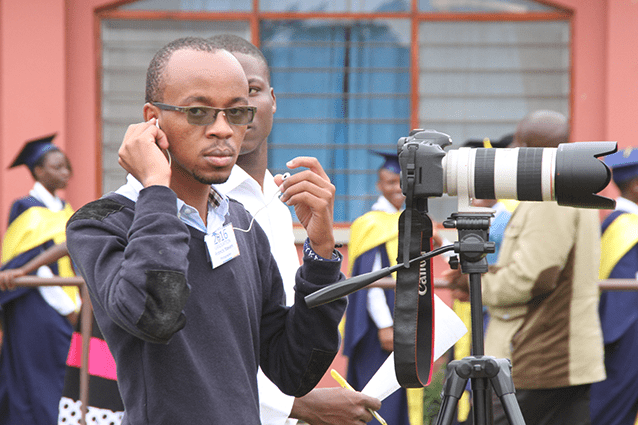
“Every child has the right to a good education like at St Jude’s,” Francis said when asked about why he enjoyed working at St Jude’s.
Not only are Francis and Godluck passionate about photography, they are determined to improve education in a country where most children only receive five years of schooling.
“The students are so talented,” Godluck said. “I enjoy how they look after visitors and it is a joy to take their picture.”
As children, neither expected to become a photographer. Francis, a natural mr-fix-it who is currently studying computer science at university, had plotted an entirely different career course.
“When I was younger I actually wanted to be a pilot,” he said.
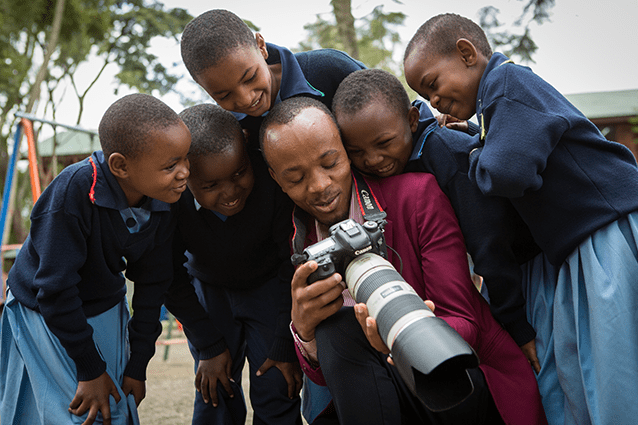
“It was cool seeing planes fly. As I got older I started to fix radios and cell phones. Cameras were fairly basic until the first camera phones came to Tanzania.
“Then, oh wow, I loved taking photos with my first camera phone and found what I wanted to do!
“My Dad helped me start out. He believed in me. Cameras were really expensive but he was so happy that I had found my calling he did everything he could to help me get my first one. He said ‘We don’t have money but we will find a way.”
Like many young people growing up in Tanzania’s safari hub of Arusha, Godluck wanted to get into the tourism industry.
”I wanted to be a tour guide,” he said.
“I loved seeing the safari trucks and all the amazing animals we have here!”
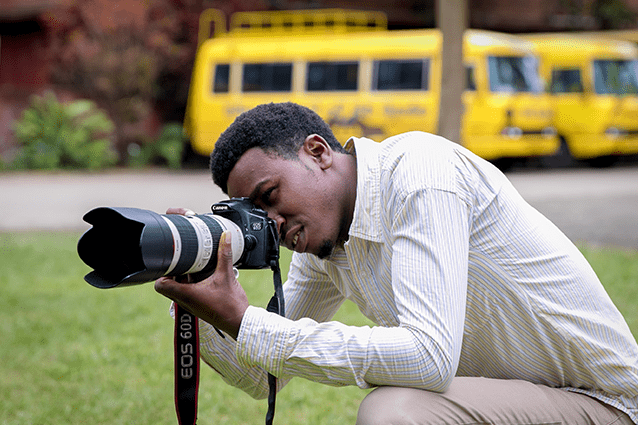
While photography was not the career either expected, they have found it is their way to help their country and promote the beauty of Tanzania to the outside world.
“I love that so many people around the world are learning more about Tanzania because of St Jude’s,” Francis said.
“They aren’t only helping educate our students – they are learning more about our country and our culture because they are supporting St Jude’s.”
You can also help give underprivileged students a chance at a high-quality education by sponsoring today! Go to: www.schoolofstjude.org/sponsor
‘It was a day of its own kind,’ exclaimed Nestory Msoffe, our Secondary School Headmaster, as he proudly watched 2,000 students, teachers, members of the community and school supporters leave our secondary school.
They had just enjoyed our yearly St Jude’s Day celebrations when we celebrate our school’s namesake and give thanks as we continue our mission to fight poverty through education.
The day began with an assembly full of singing, dancing and speeches celebrating our success and growth from just three students in 2002 to almost 1,800 students now.
Secondary Master Adam Myombe enjoyed the dance performance by our youngest Grade 1 students.
“They sing with such passion. It is so enjoyable to watch them have fun,” he said.
The Glacious dance group of secondary school students was Elton from Form 5’s favourite performance.
“They looked so smart with their black shirts. Their traditional dancing was mesmerising to watch,” he said.
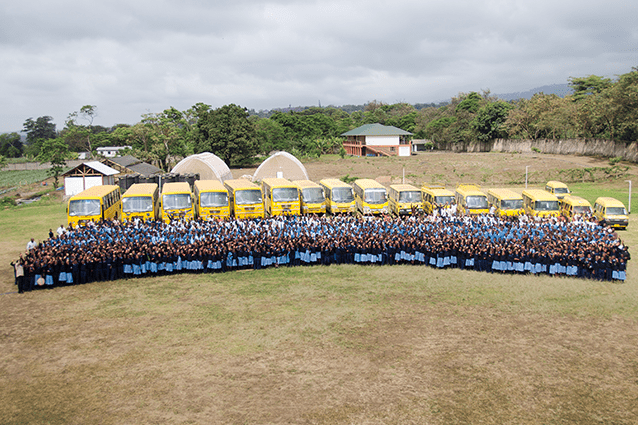
Our school choir sang gospel songs and members of the local church were invited to perform a mass service to bless the school and pray for our student’s success in upcoming exams.
George Stephen, our Primary School Headmaster, said that the mass service was his favourite moment of the day.
“The students behaved very well throughout the service and the choir was fantastic,” he said.
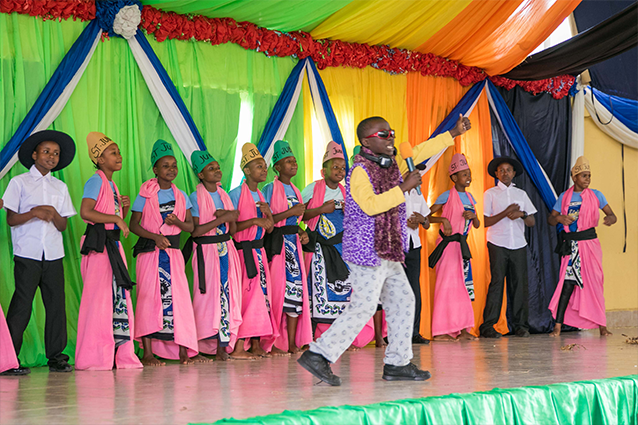
After assembly everyone poured out of the hall to enjoy a scrumptious lunch of ‘royo’, or roast beef, rice and fried bananas with fruit salad for dessert.
“I loved the performances but the lunch was the best,” said Gloria from Grade 6. “Such a treat!’
As Gemma, our school founder, was proud to announce at the start of the assembly, “How happy I am to see how this school has grown over the last 14 years. Here’s to 14 more!”